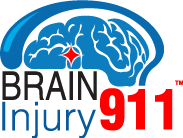Symptoms
The Different Levels of Brain Injury Symptoms
Brain damage will result in different levels of symptoms. The medical profession describes a hemorrhage (bleeding) in the brain as small or large. Bleeding is considered small if it does not result in a midline shift of the brain. A midline shift of the brain is where the brain is shifted in any direction off of its centerline.
We believe small and large is too broad to encompass all concussion and brain injuries. We describe the different levels of brain injury symptoms as:
Serious symptoms
Serious symptoms result from MTBI or Mild Traumatic Brain Injury and may go unnoticed for a period of time of weeks to months or years and are often never even recognized. Symptoms may include one or more of a myriad of functions such as physical, cognitive and behavioral. See a long list of serious symptoms below.
Approximately 80% of brain injuries are considered mild. Are there really mild symptoms of brain injury? We say no, because the significant brain injuries described below are not mild to anyone suffering from them. They are only minor in that they haven’t resulted in death, at least yet. Even mild symptoms which go undiagnosed from concussions sustained by football players can cause dementia later in life which leads to early death.
MTBI or Mild Traumatic Brain Injury as opposed to TBI or Traumatic Brain Injury is called mild because medical professionals have a high bar when measuring injuries. For instance, a brain hemorrhage which is bleeding in the brain is considered to be small unless there is a midline shift of the brain at which point it is considered large. However, a midline shift is a shift of the brain past its center line and is often associated with high intracranial pressure (ICP), which can be deadly.
This video of a CT scan shows a small hemorrhage (bleeding) within the left ventricular body and atrium of the brain. It is a small hemorrhage because the brain has not shifted past its centerline.
Severe symptoms
Severe symptoms of brain injury are also easily recognized such as as drooling, speech defects, seizures and other symptoms (these may also be symptoms of a major brain injury).
Major symptoms
Major symptoms of brain injury are easily recognized such as inability to speak or perform normal functions.
Death
Death occurs when brain injury reaches the level that the brain can no longer control the vital functions and organs such as the heart and lungs, the injury results in death. These functions may be sustained by life-support machines.
Symptoms of Mild Traumatic Brain Injury (concussion)
One or more of the following symptoms occurring more frequently than usual or after your accident may indicate you have a mild traumatic brain injury. Note that you will not experience all of these symptoms and see below why symptoms may show up long after an accident:
Physical symptoms of concussion:
- Chronic headaches
- Severe headaches
- Fuzzy or blurry vision
- Hearing loss
- Tinnitus (ringing in your ear)
- Dizziness
- Nausea
- Altered taste and smell
- Sensitivity to noise or light
- Balance problems
- Numbness in arms
- Loss of appetite or increase in appetite
- Sexual dysfunction
- Weight change
- Fatigue, feeling tired, slow or lacking energy
- Insomnia or sleeping more than usual
- Sleeping less than usual
- Trouble falling asleep; or waking up from a deep sleep
Cognitive symptoms of concussion:
- Difficulty thinking clearly
- Attention problems
- Difficulty concentrating
- Poor judgment
- Impulsiveness
- Occasional or slight confusion
- Mild memory loss
- Difficulty recalling words and names
- Amnesia
- If a student in school, a change in grades after the accident
- If employed, a change in employment records such as noting difficulties performing tasks or ability to get along with other employees
Emotional symptoms of concussion:
- Irritability
- Being argumentative
- Sadness or depression
- Being more emotional
- Emotional swings
- Anxiety or nervousness
- Panic attacks
- Sudden outbursts of uncontrollable crying or laughing
How soon are symptoms of Mild TBI noticeable?
Symptoms of a mild traumatic brain injury can start immediately with nausea or vomiting but there may be no immediate symptoms. Onset of symptoms may occur days, weeks, or months after injury. However, symptoms may be noticed weeks or months after onset. Symptoms are often noticed but the person affected is usually unaware that the symptoms are the result of a brain injury. Consequently, a diagnosis may occur years later or never at all.
Why can it take so long to become aware of or diagnose the symptoms?
- Accident victims are acutely aware of the most painful injuries first and later become aware of other less painful injuries after the most painful ones lessen. “Mild” TBI symptoms are often overlooked.
- Even where a brain injury is observed and documented in a hospital, it is often barely mentioned to the patient and frequently not followed up. If a brain hemorrhage is observed on a CT scan, emergency room doctors are concerned with making sure the patient survives. Upon discharge from the hospital, the patient often goes home without further treatment or follow-up for the brain injury.
- When a patient becomes aware of his/her symptoms, the usual thought is that the symptoms will eventually dissipate. After many months of continuing symptoms, medical advice may finally be sought.
- Some people are too embarrassed to admit or tell anyone about their symptoms, especially if long after an incident causing the injury because the patient doesn’t associate the symptoms with the injury.
